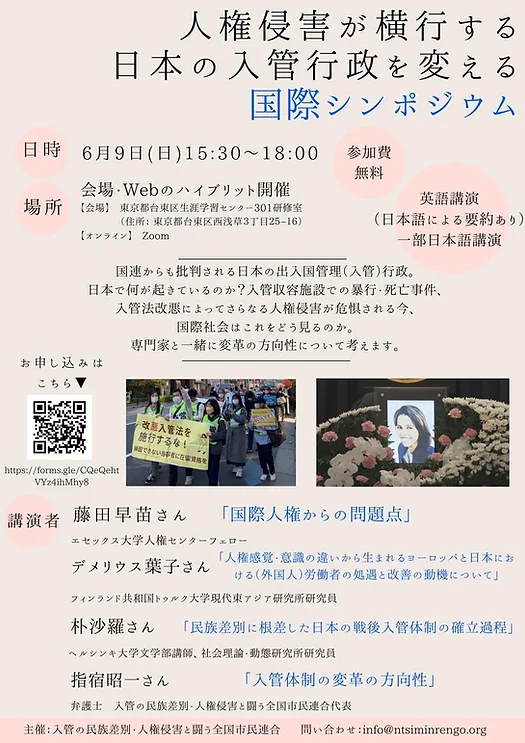人権侵害が横行する日本の入管行政を変える国際シンポジウム
- hiroshimaningenda
- 2024年6月9日
- 読了時間: 6分
★国際シンポジウム当日の様子は、youtubeで視聴できます。
The Symposium held last month marks our first major step in bringing international attention to the issue of Japan's backward and cruel immigration policy. Since I played a small part in planning it, I got the chance to see the preparation behind the scenes that led up to the event. The agenda was quite ambitious: Three guest speakers, two of them halfway across the world participating online, giving talks in both English and Japanese, followed by a statement from Attorney Ibusuki and short speeches from Wishma Sandamali's bereaved sisters, Nigerian refugee Elizabeth Aruoriwo Obueza, BOND member Ms. Juna Nin, and film director Ko Chanyu, all packed into two and a half hours. I was sure that the event would run over time, but miraculously it all went according to schedule, thanks to the hard work of all those involved, especially the on-site team who conducted the event.
(先月開催されたシンポジウムは、日本の後進的で残酷な移民政策に国際的な注目を集めるための大きな第一歩となりました。私はこのシンポジウムの企画に少しだけ携わったので、開催に至るまでの舞台裏の準備を見ることができました。議題はかなり野心的なものでした。3人のゲスト・スピーカー、うち2人は地球の裏側からオンラインで参加し、英語と日本語の両方で話をしました。その後、指宿弁護士の声明、ウィシュマ・サンダマリさんの遺族姉妹、ナイジェリア難民のエリザベス・アルオリウォ・オブエザさん、BONDメンバーのジュナ・ニンさん、映画監督のコ・チャンユさんのショート・スピーチがあり、すべてを2時間半に詰め込みました。時間オーバーを懸念しましたが、すばらしいことに予定通り進行できたのは、関係者、特に現場スタッフの努力の賜物だと思います。)

The three guest speakers approached the issue of Japan's immigration policy from different perspectives, giving a comprehensive overview of the issue.
(3人のゲストスピーカーは、日本の移民政策について異なる視点からアプローチし、この問題を包括的に概観しました。)
Dr. Fujita's talk at the start of the event did a very good job of bringing the audience up to speed regarding the legislative side of Japan's immigration policy, focusing on the lead up to the amended Immigration Control Act, which came into effect the day after the symposium.
(冒頭の藤田氏の講演では、シンポジウムの翌日に施行された改正出入国管理法までの流れを中心に、日本の出入国管理政策の立法面について、最新の情報を提供しました。)

She also laid bare the utter lack of interest in upholding international law amongst Japanese politicians, and effectively dismantled the government's argument (that the UN recommendations don't have to be adhered to because they are not legally binding) by explaining that the Special Rapporteur's comments are based on the human rights treaties that Japan is a signatory of, and therefore must uphold.
(彼女はまた、日本の政治家が国際法を守ることにまったく関心がないことを露呈させ、特別報告者のコメントは日本が加盟している人権条約に基づくものであり、従って守らなければならないと説明することで、政府の主張(国連の勧告は法的拘束力がないため守る必要がない)を効果的に打ち砕きました。)
Dr. Demelius' talk approached the issue of Japan's immigration policies from a completely different angle, comparing and contrasting the status of migrant workers in Europe and Japan. She explains that Japan's poor treatment of migrant workers is completely at odds with its economic needs; Due to its declining population, Japan needs to attract young workers with diverse skill sets, but its harsh immigration policy coupled with structural problems in the labour market (including low wages, extremely hierarchical company structures leading to exploitation, and increased number of labour contracts that lack welfare components) are not likely to appeal to foreign workers.
(デメリウス先生の講演は、ヨーロッパと日本の移民労働者の状況を比較対照しながら、まったく異なる角度から日本の移民政策の問題にアプローチしました。人口減少のため、日本は多様なスキルを持つ若い労働者を惹きつける必要がありますが、厳しい移民政策と労働市場の構造的な問題(低賃金、搾取につながる極めてヒエラルキー的な企業構造、福祉的要素を欠く労働契約の増加など)が相まって、外国人労働者にアピールすることはできないでしょう。)

Dr. Demelius also emphasises the need to uphold human rights throughout the workforce, whether or not foreign workers are involved. According to her, this is not just a moral consideration, but a necessity if Japan wishes to maintain economic stability.
(デメリウス先生はまた、外国人労働者の有無にかかわらず、労働者全体の人権を守る必要性を強調します。彼女によれば、これは単なる道徳的配慮ではなく、日本が経済の安定を維持したいのであれば必要なことなのだといいました。)
The last lecture by Dr. Park reviewed the origins of Japan's immigration control regime, and explains that two of its oft criticised characteristics (1. Highly arbitrary administration, resulting from the fact that the same department has jurisdiction over both immigration and residency 2. Lack of procedural rights) are products of the swift collapse of the Japanese empire after World War II. After the turmoil resulting from the collapse of the empire and Japan's withdrawal from its former colonies, many refugees fled to Japan, and this movement of people and goods was labelled "illegal" by the Japanese government.
(最後の朴氏の講義では、日本の出入国管理制度の成り立ちを概観し、よく批判される2つの特徴(1.出入国と在留の両方を同じ部署が管轄していることから生じる極めて恣意的な管理 2.手続き上の権利の欠如)が、第二次世界大戦後の日本帝国の急速な崩壊の産物であることを説明しました。大日本帝国の崩壊と日本の旧植民地からの撤退による混乱の後、多くの難民が日本に逃れてきましたが、こうした人や物の移動は日本政府によって「違法」とされました。)
The most representative example of this suppression of movement was that enforced against Koreans; Though they were considered Japanese citizens under the Japanese empire, after the war the Japanese government suppressed Koreans from entering Japan, under a number of different pretences. In fact, the last ordinance enacted by the Japanese Empire on May 2nd, 1947 was one that allowed the government to treat ethnic Koreans and Taiwanese as foreigners, despite their status as Japanese citizens.

(日本帝国下では日本国民とみなされていたにもかかわらず、戦後、日本政府はさまざまな口実で朝鮮人の日本への入国を抑圧しました。実際、1947年5月2日に大日本帝国が制定した最後の条例は、日本国民であるにもかかわらず、政府が朝鮮民族や台湾人を外国人として扱うことを認めたものでした。)
Like Dr. Demelius, Dr. Park emphasises the fact that the perceived "duality" (between ethnically pure Japanese citizens on the one hand, and foreigners on the other) is a false one, and that when looked at from a historical perspective, it becomes clear that immigration issues are fundamentally human rights issues.
(デメリウス先生と同様、朴先生も、(民族的に純粋な日本国民と外国人との間の)「二元性」は誤ったものであり、歴史的な観点から見れば、移民問題は基本的に人権問題であることが明らかになると強調しています。)
The Symposium's recording I think will serve as an important storehouse of knowledge regarding the present reality of Japan's immigration policies. Events like the Symposium serve as important resources for spreading awareness, and should be used to increase pressure on the Japanese government, from both within and without, to reform the law to protect those whose human rights are being violated.
(シンポジウムの記録は、日本の移民政策の現状に関する重要な知識の宝庫となるでしょう。このシンポジウムのようなイベントは、意識を広めるための重要なリソースであり、人権が侵害されている人々を保護するための法改正を行うよう、日本政府に対する内外からの圧力を高めるために利用されるべきだと思います。)
👉当日の動画は、こちらから視聴できます。
*写真は、
左上:指宿弁護士(入管闘争市民連合代表)
中上:エリザベスさん(仮放免者)
右上:学生支援者
左下:ポールニマさん、ワヨミさん(ウィシュマさんの遺族)













コメント